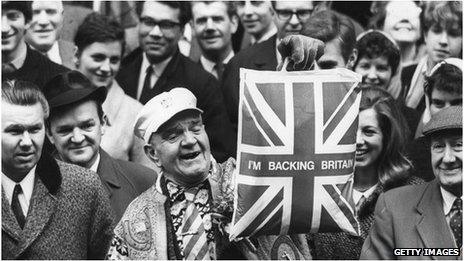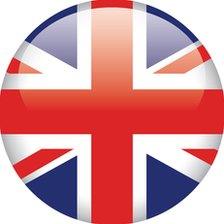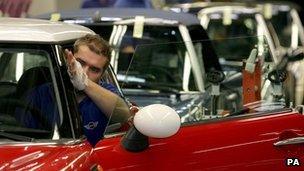Buy British: Why isn't there a new campaign?
- Published
- comments

The 1968 I'm Backing Britain campaign was enthusiastic but short-lived
The British economy is in the doldrums, with the manufacturing sector flagging, so why aren't there more campaigns encouraging people to be patriotic and buy products made in the UK?
When buying a jumper, a piece of furniture or a bag of apples, do you check to see where it has come from?
Do people care whether it was designed, manufactured or grown by British firms or farms?
These are troubling times for Britain's manufacturing sector, once a relative bright spot in the country's lacklustre recovery, which contracted at its fastest pace in more than two years in October, as new orders plummeted.
But there is unlikely to be a clamour for consumers to start buying British.
In the US, people are used to hearing the phrase "buy American". It is seen as one of the ways of putting Americans back to work.
Adverts proudly proclaim how the product was born and bred in America, and closer to home, many French people would not dream of drinking anything other than French wine or driving anything other than a French car.
There have been many Buy British initiatives over the years. Perhaps the most famous was the I'm Backing Britain campaign in the late 1960s.
It began in December 1967 when five secretaries at a ventilation and heating company volunteered to work an extra half hour each day without pay to do their bit for the flagging economy. It took on a life of its own and within the week, other companies were following suit.
Union jacks started to appear everywhere, the government endorsed the campaign and popular newspapers threw their weight behind it. But it fizzled out within months.
The then Labour MP Robert Maxwell launched a rival motto Buy British, a record sung by Bruce Forsyth sold just 7,319 copies, and campaign T-shirts were found to have been made in Portugal.
The song's chorus had the line: "The feeling is growing, so let's keep it going, the good times are blowing our way."
Surely British shoppers and workers could do with a similar injection of national pride in these economic dire straits? John Lewis certainly thinks so.
Last week, the retailer launched a new campaign to champion British manufacturing. From early next year, a Made in UK logo will start appearing on ticketing and online product information to highlight British-made products.
Other business leaders have also recently floated the idea, including the managing director of organic food brand Yeo Valley. Earlier this year, Merseyside cooker company Stoves launched a Made in Britain campaign and says some 250 manufacturers are now using the logo.
But it will take more than a handful of firms to change the British consumer mentality, says Vincent-Wayne Mitchell, professor of consumer marketing at the Cass Business School, City University London.
He says the default setting is unpatriotic because shoppers believe "German salami is better than British salami and French wine is better than British wine". Empire and immigration has led to the British consumer becoming "much less parochial".
"It takes a great deal of effort to change consumer consciousness. The government needs to be behind a campaign to give it economic credibility."

John Lewis's Made in UK logo will start appearing on products next year
But despite daily doomsday reports about high unemployment and low growth, the politicians have not been ordering us to go and buy British. Why?
Political pundit Kevin Maguire says it would be a bit like shooting yourself in the foot.
"It would be very hard for Cameron to stand up and say Buy British, when half of our exports go to the EU. If they did the same half our exports would no longer go there."
The Department for Business, Innovation and Skills says the UK relies on open markets and a Buy British campaign would be counter-productive.
"UK companies need to be able to access global markets so restricting access to the UK or the EU market could all too easily encourage retaliation, which would leave everyone worse off."
Food is one sector where the Buy British idea is having an impact. The farming industry has been trying to reverse a decline in the amount of British produce consumed - it has fallen from 75% in the early 1990s to 60% - through various campaigns.
The Red Tractor logo marks British food regarded as having high standards of safety and hygiene, animal welfare and environmental protection.
"Some food manufacturers have stepped forward and said they are only going to use British ingredients. Country Life is a very good example of that," says Sarah Whitelock, from the National Farmers Union.
Although consumers may be thinking more about where their food comes from and how many miles it travelled to reach their plate, the same cannot be said for their trainers, tables or television sets.
Prof Mitchell says the impulse to buy British tends to be associated with more expensive goods.
This means it can often be a choice between buying a luxury shirt made in the UK from London's Jermyn Street and buying a mass-produced shirt made in China from any High Street retailer.

Quintessentially British: The Mini is owned by German firm BMW, which has three plants in the UK
In addition to price, another problem for any Buy British campaign could be that many people assume that nothing is manufactured in the UK.
While the days of millions of people employed in industries producing large volumes of low-value goods may be a distant memory, the UK is the sixth largest manufacturer in the world by output and a leading exporter of high-tech goods., external
And there are plenty of other statistics to blow away the rumours of the sector's demise - manufacturing is the third largest sector in the UK, after business services and wholesale/retail, and output reached an all-time high in 2007, external.
The UK is producing more with fewer people, and like most modern economies, the focus has turned to higher-value items such as aerospace and defence equipment.
Mat Hunter, chief design officer for the Design Council, says many people imagine that the UK is devoid of manufacturing since production started to move to the Far East, but there is in its place a rich mix of high-tech manufacturing, such as race-car makers McLaren, and artisanal producers such as furniture makers Ercol.
Terry Scuoler, chief executive of EEF, the manufacturers' association, admits the sector does have an image problem.
"There's an image out there that Britain is not a manufacturing giant. While we have lost a number of iconic brands, we are still a major manufacturer. We might not be making jets but we make very large parts of them.
"Britain is a big car manufacturer. Nissan, Honda, BMW have plants in the UK."
Therein lies another problem - what counts as a British product? Scuoler says this is irrelevant and any campaign should be Made in Britain, not Buy British.
He says foreign-owned firms are a massive part of our economy and are big investors and employers.
"Made in Britain would be a healthy banner and a healthy battle cry. The issue is not British ownership. It's about investing in Britain."
Hunter thinks a Buy British campaign sounds like a throwback to the post-war years and it actually has a different meaning in today's globalised world.
"I don't think it's about spending your money at home in a xenophobic way. It's about dispelling the myth that we no longer make anything and don't develop anything wonderful."